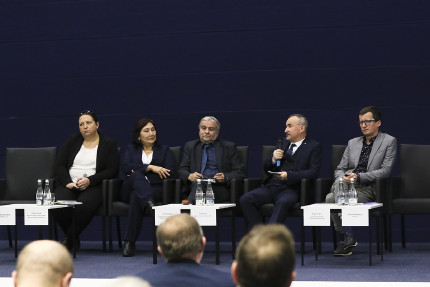The 6th Baltic-Adriatic Transport Corridor Forum
On 5-6 December 2019 the 6th Baltic-Adriatic Transport Corridor Forum took place in Chorzów. Before the conference, the General Meeting of Members of the Association of Polish Regions of the Baltic-Adriatic Transport Corridor was held, at which a new president of the Association was elected: Leszek Bonna - Deputy Marshal of Pomorskie Voivodeship, who replaced Ryszard Świlski, who was elected senator of the Republic of Poland.
The conference, which took place in the hall of the Silesian Stadium, was attended by about 100 people - representatives of local government institutions, ministries, port companies, logistics and shipowners, business environment institutions and scientific organizations. The conference was also attended by representatives of the authorities of the Blekinge Region from Sweden and the regional governments of the Czech Republic and Slovakia (Zilina and Moravia-Silesia).
"As the Silesian Voivodeship we have been recognizing the potential of transport corridors for years, therefore the development of transport and transport infrastructure is a priority in our region's development strategy. The location of the Silesian Voivodeship is our strength, which automatically makes us an important part of the Baltic-Adriatic Transport Corridor" said Wojciech Kałuża, Deputy Marshal of the Silesian Voivodeship during the opening of the Forum.
The second day of the Forum was dedicated to the block of topics such as: Cross-border cooperation of the Silesian Voivodeship with the Czech Republic and Slovakia - significant for the Baltic-Adriatic Corridor in the context of the Trans Tritia project, which was introduced by Aleksandra Krawucka, Trans Tritia project manager, presenting the general principles of territorial cooperation covering parts of Poland, Slovakia and the Czech Republic.
"Strengthening cooperation in the functioning of the freight transport system between regional authorities and key stakeholders, or increasing the share of rail and inland waterway transport is one of the key tasks of the Trans Tritia project, which includes the Silesian and Opole Voivodships and the country of Žilina and Silesia-Moravia" - said Aleksandra Krawucka.
What is the impact of the Trans Tritia project on the development of the region? Why are local governments involved in corridor projects? These are the questions answered by the speakers of the 2nd day of the Forum.
"The largest and most needed element of physical distribution is the flow using transport. The Trans Tritia project, which is based on the cooperation of neighboring regions, answers these needs. The development of infrastructure in this case is based on a bottom-up approach, where entities that are related to cooperation with local governments or simply local governments are involved" - said Prof. Katarzyna Dohn from the Upper Silesian Agency for Enterprise and Development Sp. z o.o., which is the leader of the Trans Tritia project.
- The presence of a group of specialists, researchers, scientists and practitioners gives us knowledge of where the available goods and their flows are, where production occurs and where storage takes place. Local governments are responsible to their residents for improving their living conditions, harmony and space around them, which we know as spatial planning. Without local governments, without the expertise of people responsible for spatial planning we do not have a full understanding. Therefore, the role of local governments is very important, as it is the local government as the main strategist that knows the local weaknesses, but is also able to indicate appropriate solutions. The corridor system is a higher level of spatial solutions, therefore cooperation on many levels is the key to success - said Gabriela Tomik, plenipotentiary of the Minister of Maritime Economy and Inland Navigation. The representative of the Silesian Logistics Centre spoke in a similar tone.
"The importance of local governments in creating logistics centres is confirmed by the 77% share of the City of Gliwice in the shareholding of the Silesian Logistics Centre. Infrastructure investments in logistics centres are huge costs which a private investor is not able to bear. The experience of Poland, Czech Republic and Slovakia is not an isolated case in this matter. Prior to the establishment of the Silesian Logistics Centre we studied the genesis of such centres in Western European countries. The experience of our neighbours is that usually it was the local governments that played the most important role in this kind of investments. The local government makes the land available in a reasonable place and brings in the form of transport infrastructure. Only the second stage is the entry of private operators" said Robert Goc from Śląskie Centrum Logistyki S.A.
Pavel Santarius, representing the Association for the Development of the Moravian-Silesian Region, which is a partner of the Trans Tritia project, spoke about cooperation in turn.
"Many branches of industry are concentrated in our region, transport routes intersect, hence the Baltic-Adriatic Corridor runs here for good reason. We strive to create favourable conditions for the transport of goods as well, in addition to convenient passenger transport, which is at a satisfactory level today," said Pavel Santarius. - Firstly, cooperation, secondly, work, thirdly, verification and implementation. These are the three most important elements of our cooperation, which began in 2015," added Santarius.
The moderator of this part of the Forum was Professor Lilla Knop.

